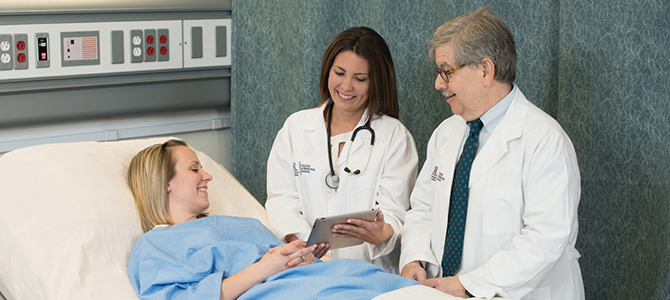
The U of A College of Medicine – Phoenix seeks physicians, scientists, health professional candidates and especially alumni looking for a way to get involved with our students and the college. The college inspires and trains exemplary physicians, scientists and leaders to optimize health and health care in Arizona and beyond. We are uniquely positioned to accelerate the biomedical and economic engines in Phoenix and the State by leveraging our vital relationships with key clinical and community partners.
You could make an impact if you are a:
- Clinician recently relocated to the greater Phoenix area.
- Retired physician.
- Physician currently practicing in the area.
- Researcher.
- Allied health professional.
- University of Arizona Alumni.
Involvement Opportunities
Case-based Instruction Facilitator
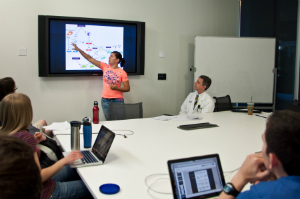
Case-based Instruction (CBI) is a teaching modality using clinical case-based scenarios which develops and hones critical thinking skills, encourages discovery and reveals gaps in student knowledge. CBI facilitators have a unique opportunity to interact with students in small group learning environments. Facilitators provide students with insight and perspectives specific to experienced clinicians or basic scientists. Faculty title required.
Become a facilitator in a few easy steps:
- Attend a CBI facilitator introductory meeting.
- Complete the CBI facilitator training module and review a short evaluation/assessment video.
- Shadow a one-day and a two-day CBI with a current facilitator.
Clinical Anatomy Block
The Clinical Anatomy Block takes place from August to December in the gross anatomy laboratory. Labs generally take place from 9 a.m. to 12 p.m. and from 1 p.m. to 4 p.m. on Tuesdays and Wednesdays with first-year medical students assigned to each table. Clinical instructors rotate throughout the lab to visit students at each dissection table, provide mentorship in their specialty, and discuss clinical correlates (targeted for first-year medical students). They may assist students in identifying structures on the donors and advise them for their dissections. In addition, students are encouraged to develop critical-thinking skills, applying their knowledge of anatomy to clinical cases. The clinical anatomy block offers a unique opportunity for physicians to work with first-year medical students as they explore the structure of the human body. Students highly value the opportunity to learn about your experiences. Faculty title required.
Halszka Glowacka, PhD
Block Director
602-827-2416
@email
Clinical Practicum Facilitator – Pathway Scholars Program
The Pathway Scholars Program exists to provide a holistic foundation for Arizona pre-med students to succeed in the rigors of medical school at the College of Medicine – Phoenix. This program exists to provide academic support, leadership development and a dedicated community and is designed for students who have experienced unique or greater than average challenges in preparing to become competitive medical school applicants.
Clinical Practicum facilitators support the Pathway Scholars Program by serving as a facilitator for an academic semester (usually two shifts per month) to allow Pathway students to shadow in a clinical environment. Facilitators should provide students with opportunities to observe, hone critical thinking skills, explore and discover clinical applications of health and reveal gaps in student knowledge. MD or DO credentials required. Faculty title recommended.
Pathway Scholars Program
@email
Racheal Mickel, MEd
Senior Manager, Pathway Scholars Program
602-827-2388
rmickel@arizona.edu
Community Clinical Experience Preceptor
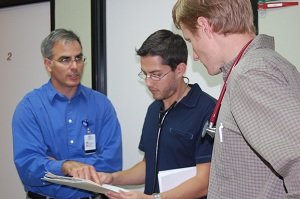
The curriculum at the U of A College of Medicine – Phoenix places a high priority on early and continuous clinical training. All first- and second-year medical students spend one half-day, approximately every other week, in an ambulatory setting working with a physician preceptor.
This part of their education is called the Community Clinical Experience (CCE). As the class grows, the demand increases for experienced physicians to mentor students as preceptors within the CCE program. The CCE program is invaluable, allowing the student to gradually assume an increasing level of patient care responsibility at local practices. This role is best served by physicians in primary care roles, such as Family Medicine, General Internal Medicine or Pediatrics. Faculty title required.
Keilani Akagi, Program Manager
602-827-2061
@email
CHIP Precepting
The Community Health Initiative – Phoenix (CHIP) is a student-developed and directed service-learning program at U of A College of Medicine – Phoenix. The initiative is comprised of various opportunities that allow medical students to serve the community through provision of clinical care, health education and mentoring. Services focus primarily on medically uninsured and underserved populations. The Community Health Initiative – Phoenix formerly operated under Commitment to Underserved People (CUP), founded at the College of Medicine – Tucson in 1979. The program was updated to expand programs, which more adequately meet the needs of the Phoenix community. These experiences may include working at a student-run clinic based at the Wesley Community and Health Center, planning and participating in health fairs, giving health-related talks to grade school students and volunteering at local clinics. The program places emphasis on the service component, helping students realize that it is part of a physician's responsibility to give back to the community. For additional information, complete the CHIP Interest Form or contact the CHIP student leaders at @email.
Leah Hillier, MD
Director of Service Learning
Office of Community Engagement
lhillier@arizona.edu
Electives Program
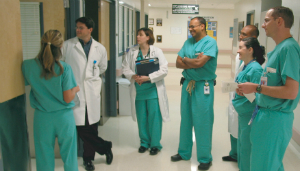
The electives program gives students a wide variety of clinical and non-clinical experiences to augment their medical education. We are excited to continue expanding our elective opportunities for our growing student body and welcome new and enthusiastic faculty who will contribute to the depth and variety of the educational experience of our students. Faculty title required.
Kate Valancova Acevedo
Director, Office of Clinical Curriculum
katarinav@arizona.edu
Academic & Alternative Service Learning Projects
Academic and alternative projects are undertaken by students completing the Service of Community Certificate of Distinction (COD). These projects focus on improving access to care and health outcomes for all Arizonans with a particular focus on populations with worse-than-average health outcomes. Project supervisors work with medical students to scope an appropriate project to support community health and medical student learning. Academic projects follow a traditional research format often with a focus on community-oriented research and patient-centered outcomes research principles. Alternative projects are more flexible and can include the following:
- Quality improvement initiatives.
- Program development.
- Production of educational materials.
- Preparation of a grant application.
- Comprehensive needs assessment.
- Comprehensive evidence review.
- A policy proposal with written ‘ask’ for a local politician.
- A summary article or opinion piece for submission to a medical journal or media outlet.
Projects must have specific deliverables related to community health and be approved by the Director of Service Learning. Students often complete their projects in affiliation with a Community Health Initiative – Phoenix - (CHIP) partner organization or local clinician.
Email with any project opportunities or to learn more:
Leah Hillier, MD
Director of Service Learning
Office of Community Engagement
@email
Medical Student Research
Many medical students are seeking research opportunities in their areas of interest. If you have a project that could use student support, submit it using this form: Mentor-Project Intake Form. Submissions include project descriptions, expectations, and contact information to help students identify a good fit.
If you’re open to mentoring in general—even without a specific project—add your name to our mentor interest list: General Mentor List.
These listings will appear only within the U of A College of Medicine – Phoenix Student Portal.
Office of Medical Student Research
@email
Simulation-Based Training Program
Our Simulation Based Training (SBT) program spans across all four years of the medical student curriculum and provides participants with a safe environment for both the learners and patients. With simulation, scenarios and events are customizable to the learning objectives and individual student needs. Simulation instructors and facilitators have the unique opportunity to work with our students as they practice procedures and work on knowledge translation in a safe and simulated environment. As part of one of the most advanced simulation curriculums in the country, you will teach at the bedside and participate in our self-reflective debriefing sessions, where our students enjoy the benefits of experiential learning. We would love to have additional energetic, engaging and brilliant physician educators.
James Lindgren, MD, Curriculum Director
@email
Services and Privileges
As an affiliate or associate faculty member of the U of A College of Medicine – Phoenix, you have access to the following university resources:
Faculty Title
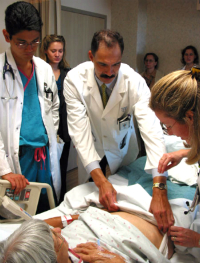
Supervision of U of A College of Medicine – Phoenix medical students requires faculty status with the College. Faculty title includes university-related discounts, access to research publications and building strong relationships with young physicians-in-training at the College. For information about obtaining a faculty title, contact the appropriate department faculty coordinator.
Faculty Development
All faculty who teach medical students have access to retreats, development workshops, meetings, grand rounds and online materials. We offer programs on the development of innovative curricular sessions and opportunities to develop effective assessment, evaluation and feedback skills. Faculty development offers assistance with academic resources and how to utilize them.
Faculty Development
602-827-2032
@email
Arizona Health Sciences Library at the Phoenix Biomedical Campus
Faculty have unrestricted access to the digital resources from the AHSL Library by use of a U of A NetID and password from your office, hospital or home. Access more than 600 electronic books, 6,000 electronic journals, and major resources such as, PubMed, Web of Science, Up to Date and the Cochrane Library. Available services include connection from off-campus, library guides, tutorials, DocOrder/Interlibrary Loan and specialized resources that support the phoenix curriculum.
602-827-2062
@email